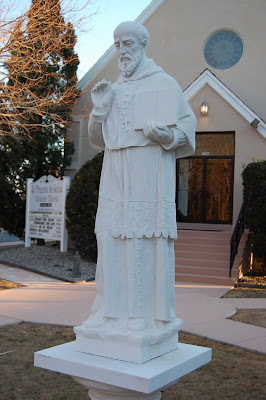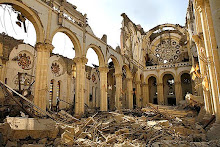
"At that time Samuel was not familiar with the LORD, because the LORD had not revealed anything to him as yet."
I had a boss in the Navy who would invite me out to have lunch with him every once in a while. I realized that he did this because he felt we were becoming "unfamiliar" to each other, that we were drifting apart somewhat in our daily routine at the military chapel, that our communication was suffering, and that our working relationship might also become weakened or harmed as a result and the people whose lives of Faith we served together might be the worse for it.
As we would sit together over a meal, doing the very humble and basic task of satisfying our hunger and taking in the physical nourishment that keeps us alive, we would at the same time rediscover the humanity in each other and begin again to communicate in the words that reveal the self and the interior life.
We became more familiar with each other because we engaged in an activity that enabled us to better and more fully "reveal" ourselves to one another. In order to accomplish this, however, it was necessary that we leave other things aside in order to "be with" one another at the table for a meal.
Within the family, too, relationships can become distant because of travel for work or other reasons, because of a schedule that places increasing demands for time and attention upon the spouses and the children, or because of other factors such as computer and internet use or video gaming that consumes more and more of one's time. In light of these factors the "familiar", which should be characteristic of the family and their shared life and the primary focus within the home, can diminish and suffer. When the relationships suffer, the love that should nourish and grow within the family can wither and can die.
The word "familiar" and the word "family" share a common root, both denoting the intimacy proper to that constellation of particular relationships which flow from the privileged way in which man and woman within marriage are called to "reveal" themselves to one another in the most intimate marital act from which can result the new life of a child.
Marriage and the family reveal for us in the most dramatic and compelling way how "becoming familiar" with another results from the choice for one person to "reveal" himself or herself to another. At the heart of this revealing of selves between two persons there must be love. But love to remain true to itself must be nourished so that it might grow. Thus, the "revealing" which lies at the heart of intimacy and makes two different people "familiar" in a physical and spiritual oneness and the source of a family, demands daily attention and effort so that its promise might be fulfilled.
One must continually make choices to reach out and reveal oneself through words and deeds in order to remain familiar: a phone call, a visit or a meal made possible by saying no to other choices that may be good or interesting or compelling but that cannot nourish the interpersonal relationships that are necessary with those whom come first in our lives.
In the Gospel two men are curious about Jesus. The like what He says, want to know Him and hear more of what He has to say. In respect for His wisdom and goodness they confer the title "Rabbi" upon him as they ask: "where are you staying?" They know that they must spend time with Him if He is to reveal more about Himself and if they are to become more familiar with Him. And they receive an invitation: "Come and see". Come and see where I am staying and decide for yourselves if you will choose to remain, to be with Me and to come to know Me.
These men, already students or disciples of the Lord by desire, have heard what He has to say and are ready for the next step: they want to become familiar with Jesus, but for in order for this to happen they must allow Him to reveal Himself; they must be with Him. And He invites: "Come and see."
You and I must hear the words of Christ, His teachings and His wisdom, as light and truth for our lives and direction for our steps, and we do so above all in the liturgy of the Word at every holy Mass.
And we, like the disciples in the Gospel reading, must also seek more: to not only hear Christ but also to be with Him, to live with Him and to make room in our lives so that He can live with us. This begins for us in the Sacraments, above all in the Eucharist. It is in sacramental encounter that we enjoy true intimacy with our Divine Lord and Savior, dwelling with Him in the familiarity of a love nourished by His self-revealing.
It is in the gift of His Body and Blood that Christ continually provides for us, as He did for the first disciples, the opportunity to "come and see" Him and to remain with Him. And it is through His self-giving that we are transformed as was Simon, a fisherman, into Peter, the first Pope and the rock upon which Jesus has built the Church, that place of faith where God reveals Himself in Christ so that we may be always with Him in the familiarity of love, now and forever.
Praised be Jesus Christ, now and forever. Amen.
((((..))))





















